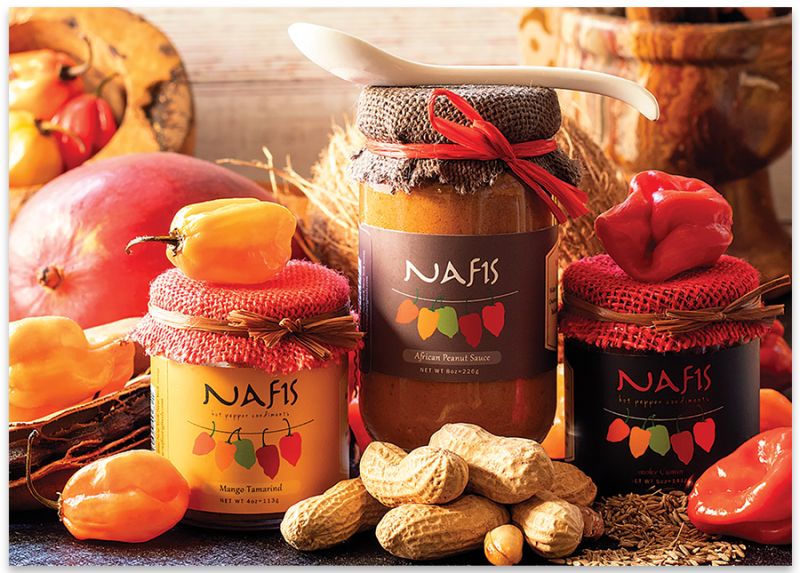The chef plans to open a small take-out restaurant on Line Street

After moving to the US, Bintou N’Daw couldn’t find the sauces she had grown up cooking with, so she started making her own and eventually launched her business, Nafis.
For chef and business owner Bintou N’Daw, life keeps cycling back to her origins in Senegal. Growing up in the port city of Saint-Louis as well as in Normandy, France, N’Daw watched her maternal grandmother cook French food and her paternal grandmother prepare African cuisine as a caterer. She briefly attended culinary school in Paris before traveling to the West Indies, Europe, and several African countries, where she honed her cooking skills. “I worked for free for different restaurants,” recalls N’Daw, whose first language is French. “I’d say, ‘Do you need someone to cook or cut up vegetables? I’m here for a few weeks—use me!’ I might not be speaking the language, but in cooking you can show what an onion is. I adapted pretty quickly. I learned for three to four years, and I started being paid a little bit.”
In 2005, N’Daw visited New York where her mother, a painter, had a show, and fell in love with the city’s energy. But despite its diversity, N’Daw couldn’t find the kinds of condiments she had grown up cooking with. So, she and her mother, Nafissatou, began making their own in 2010, naming them “Nafis.” “We bottled a sauce that is like the African peanut sauce, which is a staple in West Africa,” N’Daw explains. “We use peanuts in a savory way, and we use different spicy sauces with flavors like ginger or tamarind. You can cook these with meat or vegetables.”
N’Daw’s mother, who was working as a nanny, made dinners for her young charges using the sauces, while N’Daw gave some to friends. It was her mother, she says, who saw a business opportunity. “She said, ‘We never see this in stores, it’s mostly Asian or Indian [condiments] there, not African. Maybe people will be interested in this,’” N’Daw recalls.
After the difficult process of learning how to turn a hobby into a food business—which involved seeking permits, understanding expiration dates, and making products shelf-stable, all while studying at Cornell University in a language not her own—N’Daw launched her business, Nafis Hot Pepper Condiments, in 2015.

(Left) N’Daw relocated to Charleston in 2021 and is in the process of transferring her business operations here; (Right) Nafis offers six spicy condiments, including habanero curry.
To sell her products, she’s found she also needs to educate Americans about what they are and how to incorporate them into their meals. “It’s a challenge to explain to people what we are doing,” N’Daw says. “It’s non-gluten because we don’t use much gluten in Africa. Our flour comes from plantains and roots. And it’s buttery, but it doesn’t have milk, so it’s dairy-free as well.”
The line of six condiments—including smoky cumin, curry, mango tamarind, and ginger lemongrass—and two simmering sauces are sold on Amazon, in Whole Foods in New York, through select food delivery services, and on her website.
While on a trip to Charleston during the pandemic, N’Daw was struck by its resemblance to her home in Senegal. “I fell in love with Charleston,” she says. “It has a similarly strategic port, similar architecture, and the streets and the way the houses are built are so much like Saint-Louis island. New York had shut down, and Charleston was like a bubble in time. It was the state of mind I was looking for.”
She found a job cooking with Jill Mathias at Chez Nous and says the simplicity of the French preparations reminded her of her grandmother’s cooking. During that time, she also connected with Gullah chef BJ Dennis and was delighted to find even more similarities to her home in ingredients such as okra and root vegetables.
N’Daw moved to Charleston in July 2021, making frequent trips to New York to manage Nafis’ production. She’s taking courses through Clemson to get the necessary permits to move her manufacturing facility here with hopes to begin operations next month on Line Street, where she plans to open a small take-out restaurant.
She’s settling into her new city, appearing at next month’s Wine + Food festival, and developing a recipe for a new Holy City inspired sauce using pineapple and Carolina Reaper called “Charleston Sunset,” which she plans to add to her lineup.
N’daw says she might never get used to the way Charlestonians pronounce French street names such as “Huger” or “Legare.” But she’ll have lots of practice because one of the first outlets to offer Nafis here is Huriyali—on Huger Street.
In the Kitchen: Listen to the Hidden F&B podcast with N’Daw and find recipes at charlestonmag.com.
BY THE NUMBERS
Find recipes using Nafi’s condiments here: https://www.nafisoriginals.com/blog
Listen to the Hidden F&B podcast with Nafis founder Bintou N’Daw.